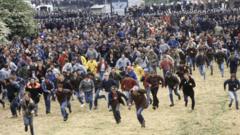Will the Orgreave Inquiry Finally Uncover the Truth?

Understanding the Historical Context of the Battle of Orgreave
The announcement of a national inquiry into the Battle of Orgreave marks a significant moment in the long-standing narrative of the miners' strike of the 1980s. This event, which occurred on June 18, 1984, stands as a testament to the tensions between the government, police, and mining communities during a pivotal period in British industrial history. The inquiry seeks to uncover the truth behind one of the most violent confrontations in this struggle, a day that left lasting scars on the miners and their families.
The Background of the Miners' Strike
The miners' strike commenced in March 1984 when the National Coal Board (NCB) announced the closure of 20 unprofitable collieries, resulting in massive job losses. This decision provoked widespread anger and discontent among miners, leading to over 75% of the nation's 187,000 miners walking out in solidarity. The strike was not only about protecting jobs but also about preserving a way of life for communities deeply intertwined with the coal industry.
The Build-Up to Orgreave
The Battle of Orgreave was a direct response to the government's actions and the perceived threat to the livelihoods of countless families. Miners from across the UK aimed to disrupt the delivery of coke to steel furnaces in Scunthorpe, believing that halting production would strengthen their cause. However, they faced overwhelming resistance from thousands of police officers, leading to violent clashes that would become iconic in the history of labor rights in Britain.
What Happened on June 18, 1984?
On that fateful day, tensions escalated quickly as miners attempted to block lorries at the Orgreave coking plant. The confrontations that ensued resulted in over 100 injuries among both miners and police. The violence of the day was shocking, and it became a defining moment not only for the strike but also for the future of labor relations in the UK.
Aftermath of the Clashes
Following the clashes, the aftermath was equally tumultuous. A total of 95 miners were arrested and faced serious charges including riot and unlawful assembly. However, the case against them collapsed in court due to allegations that South Yorkshire Police had falsified evidence. This led to questions about the integrity of the police and the wider justice system, ultimately contributing to a sense of betrayal among the miners and their supporters.
Calls for an Inquiry
For over 40 years, many of those involved in the events of Orgreave have sought answers about the violence and the legal proceedings that followed. Joe Rollin, a prominent figure from the Orgreave Justice Campaign, has been advocating for an inquiry for 13 years. His cautious optimism reflects a broader desire for accountability and justice among the mining communities affected by these events.
The Role of Government and Political Context
The recent announcement of the inquiry by Home Secretary Yvette Cooper signals a shift in political will. Cooper acknowledged that those affected had "unanswered questions for over 40 years," emphasizing the importance of delivering on promises made in the Labour manifesto. The inquiry will be chaired by the Rt Rev Dr Pete Wilcox, Bishop of Sheffield, who will oversee an investigation into both the events of the day and the subsequent legal actions.
A Landmark Moment for Justice
South Yorkshire's Mayor Oliver Coppard described the inquiry as a "landmark moment for justice and accountability." This sentiment is echoed by many who believe that understanding the events at Orgreave is essential for healing the wounds of the past. The inquiry promises to shed light on the police's actions and the broader implications of the miners' strike, contributing to a more comprehensive understanding of this critical period in British history.
Understanding the Impact on Communities
The impact of the miners' strike and the events at Orgreave extended far beyond the immediate violence. Entire communities were affected, with the loss of livelihoods leading to economic decline and social disintegration. For many, the strike represented a fight not just for jobs but for dignity, identity, and a sense of belonging. The inquiry aims to address these historical grievances and provide a platform for voices that have long been marginalized.
The Cultural Legacy of the Miners' Strike
The legacy of the miners' strike can be seen in various forms of cultural expression, from literature and film to music. Artists and creators have sought to capture the struggles and resilience of the mining communities, ensuring that the stories of those who fought for their rights are not forgotten. The inquiry into Orgreave is a continuation of this narrative, reaffirming the importance of collective memory in shaping contemporary society.
Key Figures in the Inquiry
Several key figures have emerged in the context of the Orgreave inquiry. Joe Rollin, representing the Orgreave Justice Campaign, has been a tireless advocate for truth and accountability. His efforts, along with those of other campaigners, have kept the memory of Orgreave alive and highlighted the need for justice. The involvement of political leaders, including Yvette Cooper and Oliver Coppard, reflects a growing recognition of the importance of this inquiry in addressing historical injustices.
What Will the Inquiry Examine?
The inquiry will delve into various aspects of the Orgreave events, including:
- The circumstances leading up to the confrontation
- The tactics employed by police and miners
- The aftermath of the clashes, including arrests and legal proceedings
- The impact on mining communities
- Allegations of falsified evidence by the police
By examining these elements, the inquiry aims to provide a comprehensive understanding of what transpired on that day and its lasting implications.
The Importance of Transparency and Accountability
One of the fundamental goals of the inquiry is to promote transparency and accountability. The miners and their families deserve to know the truth about the events that unfolded at Orgreave and the decisions made by those in positions of power. This inquiry represents a chance to address historical wrongs and foster a sense of justice for those who endured the violence and its aftermath.
Conclusion: A Step Towards Healing
The announcement of the inquiry into the Battle of Orgreave is a crucial step towards healing the wounds of the past. It signifies a willingness to confront uncomfortable truths and provide answers to those who have sought justice for decades. As the inquiry unfolds, it will not only serve to illuminate the events of June 18, 1984, but also contribute to a deeper understanding of the struggles faced by mining communities across the UK. The hope is that this process will bring closure to many who have lived with the scars of that day.
Frequently Asked Questions
What is the Battle of Orgreave?
The Battle of Orgreave was a violent confrontation between miners and police during the miners' strike on June 18, 1984, at the Orgreave coking plant in Rotherham. It is regarded as one of the most significant events in British industrial history.
Why is there an inquiry into the Battle of Orgreave now?
The inquiry has been initiated to address longstanding questions and grievances related to the events of Orgreave, particularly regarding police conduct and the legal proceedings against miners. It aims to provide clarity and accountability after more than 40 years.
What were the consequences of the Battle of Orgreave?
The Battle of Orgreave resulted in over 100 injuries, numerous arrests, and the collapse of legal cases against miners due to allegations of falsified evidence by police. It had a lasting impact on mining communities and labor relations in the UK.
Who is leading the inquiry into Orgreave?
The inquiry will be chaired by the Rt Rev Dr Pete Wilcox, the Bishop of Sheffield, who will oversee the investigation into the events and their aftermath.
As we reflect on the significance of the Battle of Orgreave and the upcoming inquiry, we must consider how history shapes our present and future. What lessons can be learned from this chapter in British history, and how can they inform our understanding of labor rights today? #Orgreave #MinersStrike #Justice
Published: 2025-07-20 23:14:05 | Category: technology



